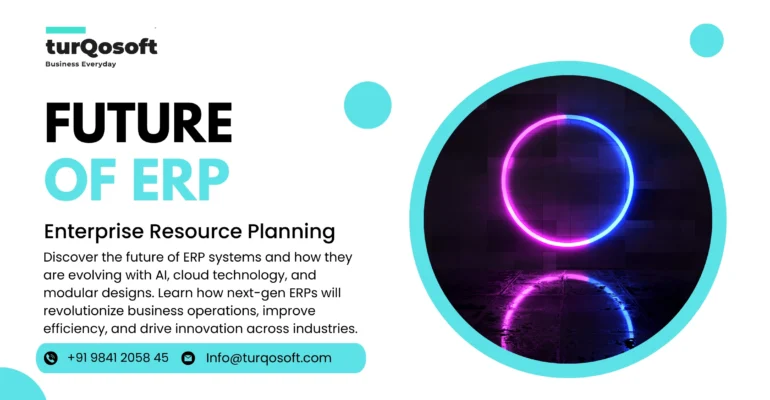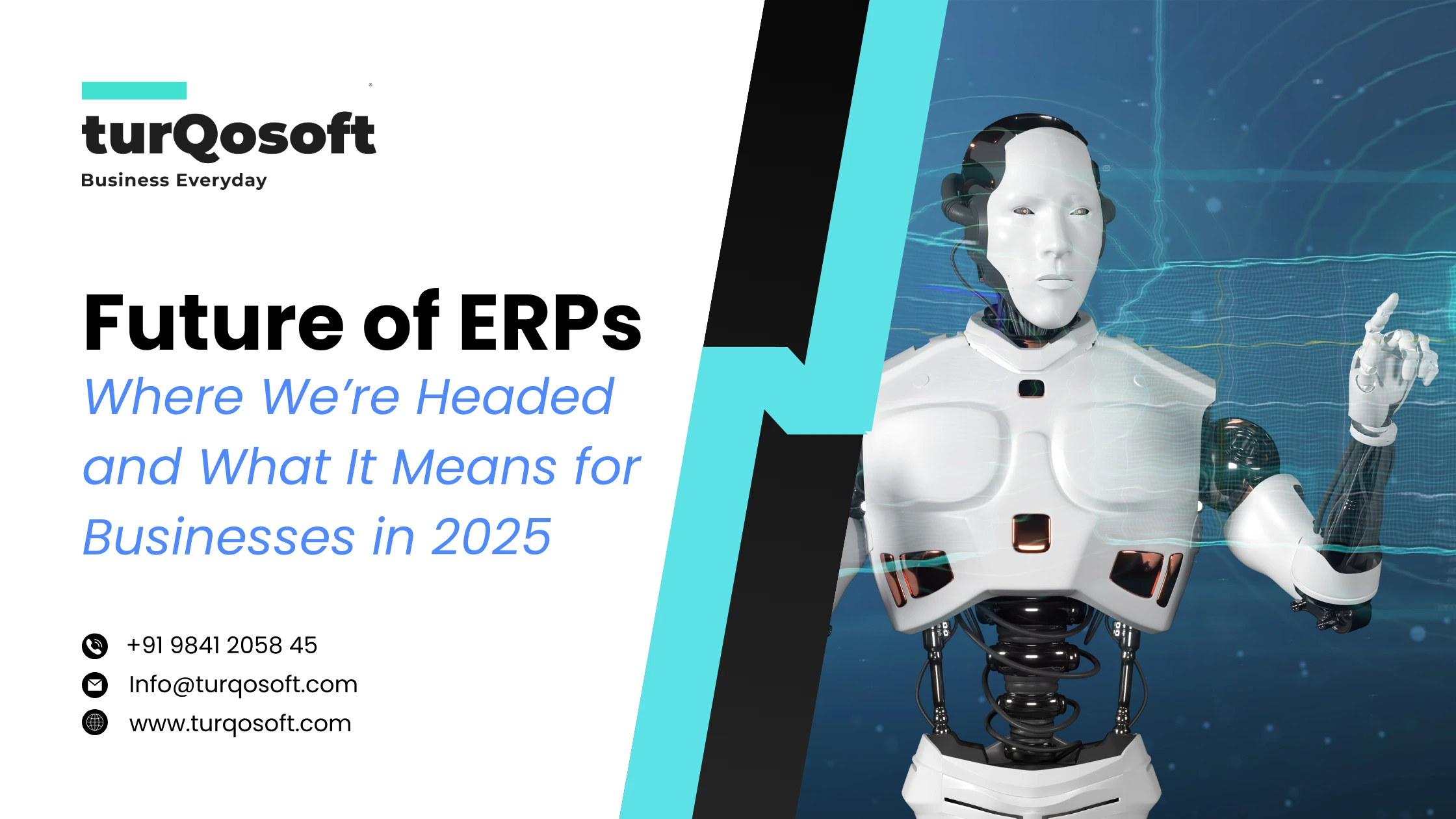Future of Enterprise Resource Planning(ERP)

Future of Enterprise Resource Planning(ERP)
The future of ERP is brimming with potential, promising to revolutionize how businesses operate and thrive in an increasingly digital world.
Enterprise Resource Planning systems have long been the backbone of organizations, streamlining processes and unifying data across departments. But as technology advances, ERPs are evolving from traditional, monolithic systems into dynamic, intelligent platforms that adapt to modern business challenges. With innovations like AI-driven insights, cloud-based scalability, and real-time collaboration, the future of ERP is all about empowering businesses to be more agile, efficient, and competitive than ever before.
Future of ERPs: Where We’re Headed and What It Means for Businesses
Let’s explore where ERPs are headed and how they’ll transform the way we work, collaborate, and innovate.

1. Cloud-First: The New Normal
The shift to cloud-based ERPs has been happening for years, but in the future, it’s likely to become the default. Why? Flexibility, scalability, and cost savings.
On-premise systems, while still in use, often come with hefty maintenance costs and lack the agility needed in today’s fast-paced business environment. Cloud-based ERPs, on the other hand, offer businesses the ability to scale up or down based on demand. Need more storage? Done. Expanding into a new region? Your ERP is already set to support it.
The future will see more advanced cloud-native ERPs that integrate seamlessly with other tools and platforms. They’ll also provide greater accessibility, allowing teams to collaborate in real time, whether they’re in the office or working remotely.
2. AI-Powered Insights and Automation
Artificial Intelligence (AI) is set to revolutionize ERPs in profound ways. Future systems won’t just collect and store data—they’ll actively analyze it, offering actionable insights in real time. For example:
- Predictive Analytics: Imagine your ERP identifying potential supply chain disruptions before they happen and suggesting solutions.
- Intelligent Forecasting: AI could help businesses predict demand more accurately, optimizing inventory and reducing waste.
- Automated Workflows: Mundane tasks like data entry, invoice processing, and compliance checks could be fully automated, freeing up employees to focus on strategic work.
AI will also make ERPs smarter and more intuitive. Think about an ERP that learns how your business operates and proactively suggests improvements. It’s like having a built-in consultant who’s always one step ahead.
3. Enhanced User Experience
One of the biggest complaints about traditional ERPs is that they can be clunky and difficult to use. The future of ERPs is all about improving the user experience (UX).
We’re already seeing a shift toward more intuitive interfaces, but the future will take it further. Expect ERP systems with voice-command capabilities, personalized dashboards, and even virtual assistants that guide users through complex processes.
User-friendly ERPs mean less training time, fewer errors, and a more empowered workforce. The days of needing a dedicated IT team just to navigate your ERP will soon be a thing of the past.
4. Modular and Composable ERPs
Historically, ERPs have been monolithic systems—big, all-in-one platforms that are difficult to customize or adapt. But the future of ERP is moving toward modular and composable systems, offering greater flexibility and customization.
What does that mean? Instead of buying one massive system, businesses can pick and choose the modules they need, creating a system tailored to their unique operations. For example, a small business might only need finance and inventory management modules, while a large enterprise might add advanced analytics, HR, and CRM capabilities.
Composable ERPs also make it easier to integrate third-party apps and services. This modularity ensures that businesses can adapt their systems as they grow or as industry demands change, making the future of ERP more dynamic and responsive than ever.
5. Industry-Specific Solutions
Generic ERPs are great for covering broad business needs, but they often fall short when it comes to industry-specific challenges. The future of ERPs will focus on creating tailored solutions for various sectors.
For instance:
- Manufacturing: ERPs could integrate with IoT devices to provide real-time updates on machine performance and production output.
- Retail: Advanced analytics could help retailers optimize pricing strategies and personalize customer experiences.
- Healthcare: ERPs could streamline patient data management while ensuring compliance with strict regulatory standards.
By addressing the unique pain points of different industries, ERPs will become even more valuable tools for businesses.
6. Integration with Emerging Technologies
ERPs are no longer standalone systems—they’re becoming hubs that connect a wide range of emerging technologies. Here are some exciting possibilities:
- IoT (Internet of Things): Imagine an ERP that pulls data from IoT-enabled devices in your warehouses, giving you real-time insights into inventory levels, equipment status, and energy usage.
- Blockchain: ERPs could use blockchain to enhance data security and improve transparency, especially in supply chain management.
- 5G: Faster connectivity through 5G will enable ERPs to handle massive amounts of data with minimal latency, improving performance and responsiveness.
These integrations will make ERPs more powerful, versatile, and indispensable than ever before.
7. Data Privacy and Security
As ERPs handle increasingly sensitive data, security will be a top priority. The future of ERPs will include advanced security features like AI-driven threat detection, end-to-end encryption, and compliance tools that ensure adherence to global regulations like GDPR or CCPA.
Additionally, expect more transparency in how data is used and stored. Businesses and their customers want to know that their information is secure, and future ERPs will need to provide that reassurance.
8. Greater Accessibility for Small Businesses
Traditionally, ERPs were seen as tools for large enterprises with big budgets. But the future will bring ERP systems that are affordable and accessible for small and medium-sized businesses (SMBs).
Thanks to cloud-based models, modular designs, and pay-as-you-go pricing structures, SMBs will have access to the same powerful tools as their larger counterparts. This democratization of ERP technology will level the playing field, allowing smaller businesses to compete more effectively.
9. Real-Time Collaboration
In an increasingly remote and globalized workforce, collaboration is key. Future ERPs will focus heavily on real-time collaboration, enabling teams to work together seamlessly, no matter where they are.
Imagine a marketing team in New York working on the same campaign as a sales team in Tokyo, all within the same ERP system. They could share data, insights, and updates in real time, ensuring everyone stays aligned and projects move forward without delays.
10. The Role of ERPs in Sustainability
Sustainability is becoming a core focus for businesses, and ERPs will play a major role in helping companies meet their environmental goals. Future systems could track carbon footprints, optimize resource usage, and suggest greener alternatives in supply chains.
By embedding sustainability into their operations, businesses won’t just benefit the planet—they’ll also improve their bottom line and enhance their reputation with eco-conscious consumers.
Conclusion
The future of ERPs is bright, exciting, and full of possibilities. From smarter AI-driven insights to modular designs and greater accessibility, these systems are set to transform how businesses operate.
What’s clear is that ERPs are no longer just tools for managing data—they’re becoming strategic partners that drive innovation, improve efficiency, and help businesses stay competitive in an ever-changing world.
So whether you’re a small business owner, an enterprise leader, or just someone interested in tech, keep an eye on the evolution of ERPs. The future is closer than you think—and it’s going to be game-changing.
Ready to take the next step? Let’s talk! Contact us today to learn how ERP can transform your business.
Looking for Expert Guidance on Implementing Next-Gen ERP?
Reach out to our team at info@turqosoft.com or call us at +91 9841205845.
Stay updated with more insights by following us on LinkedIn, YouTube, Facebook, Twitter, Pinterest, and Instagram.
Image Credit: Canva


